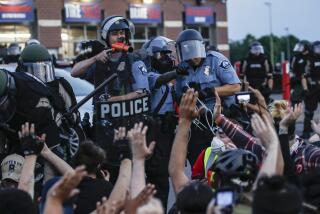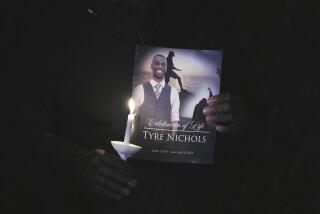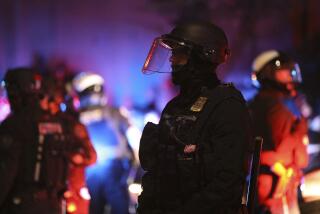Judge orders end to federal oversight of Detroit police
More than a decade of federal oversight of Detroit’s police will come to an end in 2016 following a series of reforms to the department’s use of force and a decline in officer-involved shootings, a federal judge ruled Monday.
The U.S. Department of Justice and the city of Detroit had agreed that the complaints that brought about the consent judgment issued in 2003 had been largely, though not entirely, resolved.
U.S. District Judge Avern Cohn’s ruling said the police department had complied with about 90% of the federal consent decree’s stipulations, and set the end of oversight for March 2, 2016.
“This is truly an exciting day in the history of the Detroit Police Department,” Police Chief James E. Craig told reporters at a televised news conference, saying that the department had also decreased its number of in-custody deaths, its use of force, and complaints from citizens.
Citing the civil unrest that had befallen the police department in Ferguson, Mo., after a white police officer shot and killed an unarmed black 18-year-old man, Craig said, “We have learned so much about the importance of relationships. ... There’s much to be said about the way we, as law enforcement officers, treat people and each other.”
Detroit’s then-mayor, Dennis Archer, had requested a federal review of the department’s policies in 2000; a Detroit Free Press investigation from that year said that the city’s police led the nation in the number of fatal police shootings, more than double the rate of lethal incidents in New York City during the same period.
According to federal records from the early 2000s, Detroit police also had no definition for what “use of force” was and limited most officers to using either their guns or some type of chemical spray, which meant they lacked a more intermediate option, such as a baton.
If officers didn’t use guns or spray, they were not required to report the use of force unless it resulted in injury, federal officials said.
Officials had also raised questions over the complaint process for civilians and said many of the officials who investigated those complaints were civilians with no investigatory training. It would take one to two years, and in some cases even longer, for internal disciplinary cases to have an initial hearing.
The department also used to detain witnesses to serious crimes. A second consent judgment in 2003, regarding poor detention conditions, was lifted earlier this year.
In a statement Monday, Justice Department officials said Detroit police had “effectively eliminated the unconstitutional practices” that had made federal oversight necessary, though they said more work was necessary.
As a result, Monday’s ruling gives the department 18 more months to transition away from federal oversight.
“This does not mean it is the end,” Craig told reporters, adding, “We want to reassure our community that this does not mean we will simply go back to what we were years ago.”
Detroit’s NAACP president, the Rev. Wendell Anthony, said in a statement, “Today it would appear that there is a new and different approach to community policing, where the people are engaged and respected.”
Noting that there was still work to be done, Anthony added, “One of the ways in which Detroit may not become a Ferguson, Missouri, is by respect, community engagement, and a de-escalation of the appearance of a military force inserting itself in a community of law-abiding and nonviolent citizens.”
A spokesman for Detroit Mayor Mike Duggan told the Los Angeles Times that the mayor was traveling Monday and was not able to comment on the ruling.
Follow @MattDPearce for national news
More to Read
Start your day right
Sign up for Essential California for news, features and recommendations from the L.A. Times and beyond in your inbox six days a week.
You may occasionally receive promotional content from the Los Angeles Times.







